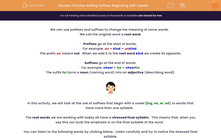We can use prefixes and suffixes to change the meaning of some words.
We call the original word a root word.
Prefixes go at the start of words.
For example: un + kind = unkind.
The prefix un means not. When we add it to the root word kind we create its opposite.
Suffixes go at the end of words.
For example: cheer + ful = cheerful
The suffix ful turns a noun (naming word) into an adjective (describing word).

In this activity, we will look at the use of suffixes that begin with a vowel (ing, en, er, ed) to words that have more than one syllable.
The root words we are working with today all have a stressed final syllable. This means that, when you say this out loud, the emphasis is on the final syllable of the word.
You can listen to the following words by clicking below. Listen carefully and try to notice the stressed final syllable.
forgot
begin
prefer
Because these words have a stressed final syllable, we have to change the root word before we add a suffix.
We double the final consonant.
For example: forgot (verb) becomes forgotten (adjective).
Did you spot the change?

Here are some examples of words that use these prefixes that we will practise in this activity:
forgetting
forgotten
beginning
beginner
preferred
You can listen to them here:
You can break the words up into the prefix and the root to help you to spell them:
forgett ing
forgott en
beginn ing
beginn er
preferr ed
Use Look, Say, Cover, Write, Check to practise spellings a few times before we begin the activities.









